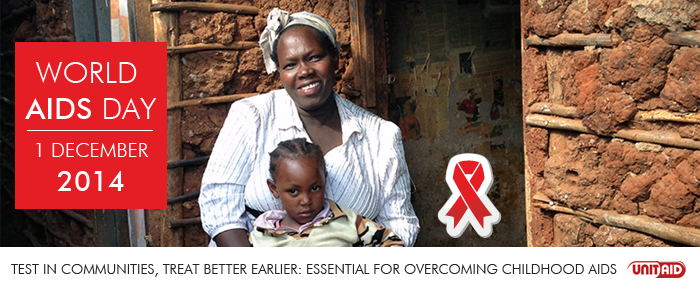Despite significant success over recent years in mother-to-child transmission of the HIV virus, there were still 240,000 new infections amongst children in 2013, mostly at childbirth.
In total, there are over 3 million children living with the disease, with only a quarter of those on treatment and children falling behind adults in HIV treatment scale up over recent years. The need to identify and treat infected infants and those children already living with HIV/AIDS is a global health priority. Lack of appropriate testing technologies and child-friendly medicines is still blocking progress.
UNITAID is investing in the development and scale up child-appropriate medicines and has joined the Paediatric HIV Treatment Initiative (PHTI), which brings it together with the Medicines Patent Pool, DNDi and Clinton Health Access Initiative (CHAI) to develop effective new formulations for infants and small children. Pioneering new paediatric medicines is particularly important as many children inherit drug-resistant forms of the virus and need more effective medicines from the outset. This is coupled with the important need to have medicines in palatable and simple forms to make treatment adherence as easy as possible.
The PHTI is now joining forces with the US President’s Emergency Plan for AIDS Relief (PEPFAR) and the Global Fund to Fight AIDS, Tuberculosis and Malaria to build the momentum for a Commitment-to-Action for a concerted effort to develop and deliver the life-saving medicines. A further significant recent step forward has been the $200 million commitment from PEPFAR to the Children’s Investment Fund Foundation (CIFF), aimed at enrolling an additional 300,000 children to treatment in the next two years in ten high-burden countries.
“One of UNITAID’s most important achievements has been to kick-start the paediatric HIV medicine market, working with CHAI,” said Philippe Douste-Blazy, Chair of the UNITAID Executive Board. “Through this project, initiated in 2006, nearly half a million children were put on child-adapted treatment, triggering the wider efforts around child-appropriate HIV medicines and ensuring today’s paediatric treatment level of around 700,000 children.”
Before UNITAID’s creation of the market, most HIV treatment for children, if available at all, was in the form of adult syrups with up to 18 foul tasting doses a day.
“Childhood HIV was very much a neglected disease eight years ago,” said Lelio Marmora, UNITAID’s Executive Director. “Thanks to UNITAID and other global partners, there has been significant change, but having 3 million children today affected, in need of testing and treatment is still unacceptable.”
UNITAID and various other organisations, are also at the forefront of rapidly scaling up access to the most effective testing technologies, including for the very youngest and devices that are designed for use at the community level. The Diagnostic Access Initiative has recently been created to unite a range of global health organisations, including UNITAID, to expand best practices and facilitate innovation for HIV testing. UNITAID has already invested $35 million to continue scaling up access to innovative point-of-care diagnostic technology for use in communities. This includes CD4 technology to measure immune level strength, viral load testing to monitor treatment effectiveness, and early infant diagnosis. Early diagnosis of infants is critical for their survival but infant testing is currently only at 40% of the estimated need. Infant testing needs to be highly sensitive as babies may retain maternal antibodies for over a year after birth.
Technologies which can reliably used in decentralised settings are also vital to help reduce the nearly 50% of positive test results which fail to reach the children’s caregivers, children who then fail to receive treatment. Without medicines, over half of those born with the virus will die before their second birthday. In 2013 UNITAID made its first direct investments to manufacturers to make new such devices available, including for viral load and early infant diagnosis.
UNITAID invests in innovation to improve medicines, diagnostics and systems for HIV, tuberculosis, malaria and hepatitis C as an HIV co-infection for the people in need.
View All News

